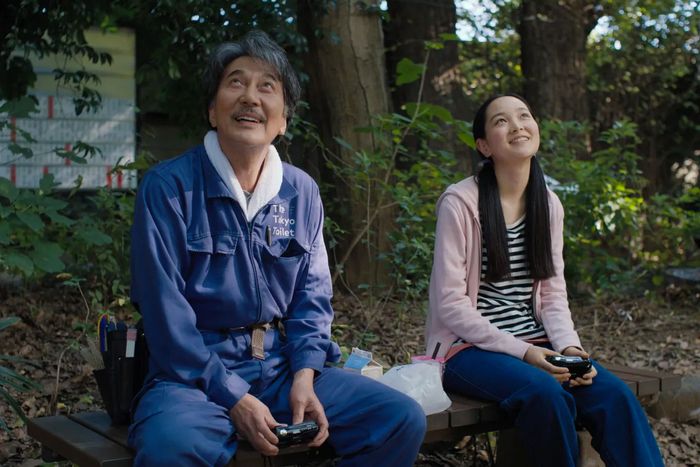
This review was originally published on May 26, 2023 out of the Cannes Film Festival. We are recirculating it now timed to Perfect Days’ upcoming U.S. theatrical release.
Here’s what we know about him. His name is Hirayama, and he’s played by the great Japanese actor Koji Yakusho. He wakes up every dawn, rolls up his bed, spritzes his plants, and puts on his Tokyo Toilets jumpsuit. He then drives around the city, quietly and meticulously cleaning its public bathrooms. He attentively wipes the bowls, mops the floors, replaces the toilet paper, passes a mirror around those tough-to-see spots to make sure they’re clean. He steps out politely if anyone comes in to use the facilities, and patiently waits for them to finish. Then it’s back to work. Somebody notes that it’s pointless to be so thorough, since it’ll all get dirty again. “How can you put so much into a job like this?” He doesn’t reply.
Hirayama eats his lunch on a park bench, leaning back and enjoying the delicate interplay of light among the trees. He loves watching shadows, leaves, branches, a stray sparkle on a ceiling. He takes 35-mm. pictures of what he sees. He says almost nothing. When his amiably unreliable younger colleague (Tokio Emoto) says that he doesn’t know what Hirayama’s voice sounds like, we’re not sure if we do either. In the evenings he visits a bustling noodle shop in an underground mall, where he’s greeted with a tall glass of water and a warm “Here’s to your busy day!” by the server. At nights he reads; he’s currently reading Faulkner, but there’s Highsmith and others on the shelves. And then he dreams, drifting and inexact, shimmering black-and-white images replaying the humdrum details of his day.
Perfect Days is like nothing Wim Wenders has ever done before, but he’s also been trying to make this movie his whole life. It’s one of two titles he has at Cannes this year, and its place in competition, it turns out, is well earned, as it’s probably the best film he’s made since the director’s cut of Until the End of the World. “There’s so many good things,” Peter Falk, the wise and worldly former angel of Wings of Desire, used to say. He was eager to tell the celestial phantoms above Berlin “just how good it is to be here — to touch something.” The wanderers of Wenders’s road movies, the ones who were either running from something, running toward something, or just trying to reconnect with the world, longed for simplicity and presence. The director’s whole career has been built on the elusive search for now. Whenever a character grasped it, they lost it. Either they vanished or the moment did. Happiness was impossible.
When Wenders faltered, it was because he got too caught up in plot and character and backstory, trying to explain who was who and why was what. In Perfect Days, it seems he’s realized he doesn’t need to do any of that. The film is always on the verge of explaining itself but thankfully never does. The key to depicting simplicity, it turns out, is to embody that simplicity. There’s a hint of family drama in Hirayama’s past, an estranged father and a distant sister, but that’s all it is — a hint. When Hirayama’s young niece shows up out of the blue one day, she has tons of questions, but he has no answers. We fear that the film is about to become a familiar tale of a young person helping an older, broken man come out of his shell — but no, it’s she who starts to see the quiet splendor of his life.
Your cousin could have written this movie. But maybe only Wenders could have directed it. He has the sensitivity to shoot the seesawing depths of Yakusho’s face. He has the eye to capture the elegant and diverse architecture of Tokyo’s public bathrooms, from futuristic orbs, to cozy huts, to vertically slatted roundhouses, to honeycombed wood panels. (It’s especially otherworldly to someone from New York, where we treat bathrooms as unmentionable pits of stained despair that must never be made accessible to the public and certainly never kept clean.) And because this is a Wim Wenders picture, Hirayama plays cassettes of Lou Reed and Patti Smith and Otis Redding and the Kinks as he drives past glimmering Tokyo, past the Skytree tower in whose shadow he lives. There’s a whole other world out there, and we sense that it sometimes whispers to Hirayama. But he’s happy where he is. “Next time is next time,” he says. “Now is now.” By the time it was over, I wanted to put on a Tokyo Toilets jumpsuit myself.
More Movie Reviews
- The Accountant 2 Can Not Be Taken Seriously
- Another Simple Favor Is So Fun, Until It Gets So Dumb
- Errol Morris Has Been Sucked Into the Gaping Maw of True Crime


